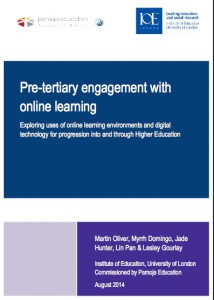Guest post by Dr Martin Oliver, Institute of Education
There are many practical reasons why people might want to study online – convenience, flexibility and so on. But are there other benefits, too?
The Institute of Education undertook a study for Pamoja Education , the only approved provider of online courses for the 16 to 19 year old students on the International Baccalaureate (IB) Diploma Programme students. They wanted to know what the distinctive experience of taking online courses alongside more conventional class-based study offered learners. To find out the answers, we surveyed their alumni and carried out a series of interviews with both students and teaching staff. (The full report on the study can be found here.)
What we found was that learners who took online courses alongside their school-based classes benefitted in several ways when they reached university. Perhaps the most important of these concerned the ways they had learnt to organize their study time and take responsibility for their learning, in order to progress through the less structured environment of online courses. For example, they were more confident about when to persist with study problems, and when to turn to a tutor for help instead.
Importantly, learning this alongside conventional classes meant that they always had a safety net – if they had problems, they could contact their tutors online, but they were also in regular contact with friends and teachers in schools who could advise and support them.
They were more familiar than their peers with the range of technologies they needed to use at University, including virtual learning environments, but also with the use of searches for academic material, rather than just for general purposes. Some of the survey respondents felt that this gave them an edge over other students.
In some ways, these were not typical students. They studied online with peers from around the world – 36 countries were represented in the survey. This exposure to other cultures and experiences challenged established school dynamics and expanded their horizons. Not every online course offers this kind of cohort, meaning that other learners are likely to have quite different experiences. However, survey analysis was between groups of IB students (those who had studied online and those who hadn’t), not between IB students and (say) those pursuing national qualifications. In other words, our analysis suggests that it was the experiences that they had, not the course they were studying or the background they were from, that resulted in the benefits they reported. Since online learning plays an increasingly important role throughout learners’ lives, early opportunities to try it out alongside conventional classes, to get those experiences and learn from the challenges in a relatively supportive environment, holds real promise.
Helen Beetham adds:
Online students have a very specific experience of learning which our studies of students in HE and FE were not really designed to explore. However, as Martin points out, most students now experience online elements even when they are enrolled in on-campus courses, and being able to study independently online is an important lifelong skill. We asked Martin to introduce these findings as we felt they added a new perspective to the digital student work. If you know of other studies that contribute to our understanding of students’ digital experiences and expectations, please leave a comment.

